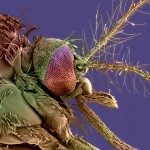Lien vers Pubmed [PMID] – 30135220
mSphere 2018 Aug;3(4)
The chikungunya virus (CHIKV) is transmitted by female and mosquitoes, mostly present in (sub)tropical regions. No antivirals are available to treat CHIKV infections. If antiviral drugs are proven efficient to treat CHIKV-infected patients, it will be pivotal to determine whether drug-resistant viruses can be transmitted from one human to another by their mosquito vectors. We orally infected mosquitoes with a blood meal containing wild-type or drug-resistant CHIKV variants (i.e., MADTP CHIKV, with mutation in the nsP1 gene, and T-705 CHIKV, with mutation in the RNA-dependent RNA polymerase [RdRp] gene). Viral loads were quantified in bodies (infection), heads (dissemination), and saliva (transmission) of individual mosquitoes. The infection rate of the resistant viruses was similar to that of the wild-type virus. However, the dissemination of T-705 CHIKV was markedly decreased compared to wild-type and MADTP CHIKV. Furthermore, T-705 CHIKV was only transmitted in the saliva at day 20 postinfection (p.i.), whereas transmission of wild-type CHIKV was observed at day 3 p.i. The attenuated phenotype of the T-705 virus was confirmed in mosquito cell culture, whereas the replication fitness in Vero cells was similar to that of the wild type. In bodies and heads of mosquitoes infected with the resistant variants, the resistant phenotype and genotype were retained. Also in the saliva, the resistant genotype of MADTP CHIKV was maintained. Our results illustrate that the fitness of drug-resistant variants should be evaluated in both hosts to be able to select antiviral drugs with a limited risk for the spread of drug resistance by mosquitoes. Because of its global reemergence and unusual morbidities associated with infection, the chikungunya virus (CHIKV) has become a substantial public health problem. However, no antivirals are currently available to treat CHIKV infections. If antiviral drugs will prove to be efficient to treat CHIKV-infected patients, it will be essential to understand if drug-resistant viruses can be transmitted from one human to another by the mosquito. We therefore orally infected mosquitoes with drug-resistant CHIKV variants and determined the replication and transmission levels. One of the antiviral drug-resistant CHIKV variants could efficiently replicate and disseminate in both laboratory and field-collected mosquitoes. In addition, this variant retained its drug-resistant genotype in the saliva. In contrast, the other drug-resistant variant was markedly attenuated in mosquitoes. Our results illustrate that extra caution for drug resistance should be considered when developing an antiarbovirus antiviral in order to minimize the risk of spreading drug resistance by mosquitoes.


